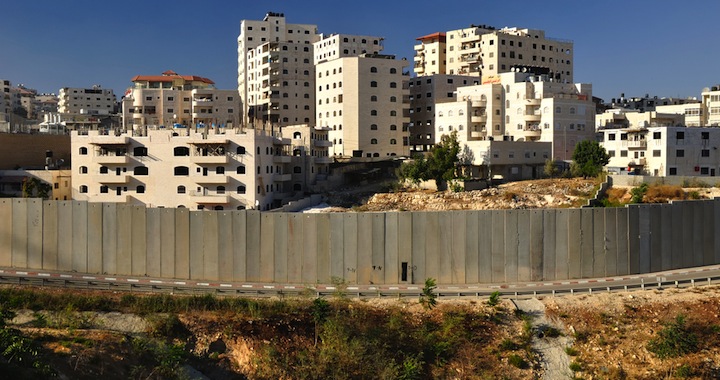“O little town of Bethlehem” is one of the most famous Christmas Hymns. Bethlehem has become almost a mythological place: Children imagine it with a few “huts, ” a few camels and the holy family. At the time of Jesus, Bethlehem was a little town of 300-1, 000 inhabitants. What people might not know is that the city of Bethlehem today is not in Israel but in Palestine, and that it is a bustling city with 28, 000 people. One third of them are Palestinian Christians.
When Christians today sing “O little town of Bethlehem” they seldom think of the real city with the real people. When it comes to Bethlehem and to Christmas, Christianity has become so spiritualized and so commercialized. It’s all about Santa, the Tree, the gifts, and the food. But what happened in Bethlehem 2000 years ago was something real. Jesus was born as a refugee. His family was forced to leave Nazareth and go to Bethlehem. Later his family had to flee the brutality of King Herod and go into hiding in Egypt for two years. Today Bethlehem has almost 20, 000 Palestinian refugees who lost in 1948, when the State of Israel was established, their land, homes and belongings and came to Bethlehem seeking refugee. They are still living in three refugee camps waiting for a just solution.
The Christmas story of the Bible has nothing to do with what we know today as Christmas. Take the story of the Magi or the kings from the East. That story is read in a nostalgic way and is being performed over and over again. But a closer look at the story will show that it talks about the Roman Empire and their occupation of Palestine. Empires do not control only the native people they rule; they also work to ensure that visitors coming in contact with the land and its native people are controlled. In 2010 a well-known evangelical preacher came to attend a theological conference in Bethlehem. Upon arrival at Ben Gurion Airport in Tel Aviv, Israeli officials told him that they would like to invite him for a cup of coffee in their offices and have a chat. For almost four hours he was questioned about his decision to attend a conference in Bethlehem, what he thought of the Palestinian Kairos Document, and how he knew some of these “radical” Palestinian theologians. This was supposed to be VIP treatment. Others who are part of solidarity movements with Palestine are often detained at the Israeli airport and sent back to their home countries. When this highly reputed American evangelical preacher told us his story I told him, “Welcome to Palestine. As someone who knows his Bible well you should not have been surprised by such treatment. The same VIP treatment was also extended to the Magi from the east that came to see Jesus in Bethlehem. Herod too invited them ‘for a cup of coffee’ to ascertain why they wanted to travel to Bethlehem, and how they knew about the newborn child. So now you have experienced something biblical. Welcome to the Holy Land!” I still recall how everyone in the group laughed. Then an American woman attending the conference asked me, “So what should we tell the Israelis at the airport when they question us about where we have been? What should we say?” I replied “I wish I could tell you what the angel told the Magi, after visiting Jesus; basically showing them another route not controlled by the Empire. Unfortunately, all roads, airports and borders are controlled by Israel. By the way, an invitation to drink a cup of coffee by Israeli or Arab intelligence authorities is known in political jargon as interrogation.” We seldom read the story of the Magi as them being interrogated by the occupation that holds the power. But this is what it was.
Bethlehem at the birth of Jesus was a besieged city. Today Bethlehem is again a besieged city surrounded from three sides by a 25 foot high concrete wall. So what if Jesus were to be born today in Bethlehem? If Jesus were to be born this year, he would not be born in Bethlehem. Mary and Joseph would not be allowed to enter from the Israeli checkpoint, and so too the Magi. The shepherds would be stuck inside the walls, unable to leave their little town. Jesus might have been born at the checkpoint like so many Palestinian children while having the Magi and shepherds on both sides of the wall.
So where is the Gospel in all of this? The good news is this: God came into no other than this troubled, wounded and real world. He is real and wants to enter into our real world with all its complexities and fears. Christmas is real. It is not a myth or a wonder world. The Gospel is that God became one of us, one like us. He came as a child, vulnerable, and weak. And yet through his vulnerability was able to overcome the empire. Christmas is God’s promise to us that we will have life, peace, and future. For us Palestinian Christians and citizens of Bethlehem the Christmas story of then is our story today. Praise God that Jesus is the same: yesterday, today and forever.
—-
Rev. Dr. Mitri Raheb is Pastor of the Evang. Lutheran Christmas Church in Bethlehem and the President of Diyar Consortium, one of the leading Christian Organizations in Palestine.

